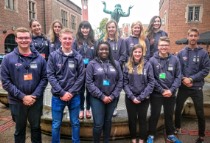Become a Student mentor
 The Student Mentor Scheme is a support service run by students for people living in halls. It is delivered by the Guild of Students, in partnership with Hospital and Accommodation Services at the University.
The Student Mentor Scheme is a support service run by students for people living in halls. It is delivered by the Guild of Students, in partnership with Hospital and Accommodation Services at the University.
The scheme is recruiting for the next academic year, so we have been speaking to two current mentors, Amie Pemberton and Jake Scott, about their experience and advice for applicants. Find out more on the Student Mentor Scheme webpage.
Why did you decide to become a student mentor?
Jake: In my first year my friend put me in touch with the Student Mentor Scheme as I was having a difficult time. I had a really positive experience; it was very helpful just to get the problem off my chest. I wanted to give back to the scheme and I’m a firm believer in people helping each other. I also used to do something similar in my secondary school, so it was a natural progression.
Amie: In my first year I didn’t get on particularly well with my flatmates and I didn’t know about the student mentor scheme. After my experience I wanted to help other first year students to enjoy their time. It’s so important to have someone you can talk to about the little things.
How did you find the application and interview process?
Amie: It was the first time I had done an interview, so it was kind of scary for me but I really liked it. The Student Support Advisors were really nice and put me at ease.
Jake: The application was interesting because it forces you to think about your experience and why you want to become a Student Mentor. In the interview they give you a scenario and you write down what you would do in that situation. A lot of people approach it differently so it was interesting to find out what answers the other mentors had given.
What does your role involve?
Amie: We have a rota for office shifts between 4.00pm and 8.00pm in the Student Mentor Scheme office, which is based in the Student Hub on the Vale, next to the Duck and Scholar. These are for drop-ins, to answer emails and to take phone calls.
Jake: There are four key areas: housing, academic, finance and wellbeing. We help with a lot of share living issues, such as people being too noisy, and support people to find houses when they leave University accommodation. Wellbeing is our main focus; we offer one to ones for people who need extra support and can signpost to other services at the University and in the community.
You can get some difficult cases, how do you prepare for these?
Amie: We did a week’s training before we started and team building exercises. It was really good to get to know each other as the role can be quite full on. It’s good to have other people who can support you.
What do you enjoy most about your role?
Amie: I really liked Welcome Week. Each mentor is in responsible for a particular accommodation and at Welcome I was in charge of 30 team members. It was fun because I was making sure everything was okay; it also felt really nice to be able to reassure parents that there is support available.
Jake: For me, the most enjoyable experience is seeing people progress and knowing that I have helped.
What advice would you give to someone who was thinking of becoming a Student Mentor?
Amie: Do it, it’s such an amazing job!
Jake: My advice is be patient and a good listener. You also need to be prepared that there may be some difficult cases that you cannot personally help with.
How do you think your experience as a Student Mentor will help you in the future?
Amie: I would like to go into teaching so my experience will help me to identify any children with welfare issues. It has also made me consider a career in support.
Jake: I think it has made me more patient, approachable and open-minded. I’d like to think that in the future, the people I will be working with will feel comfortable telling me if they think there is a better way of doing something.